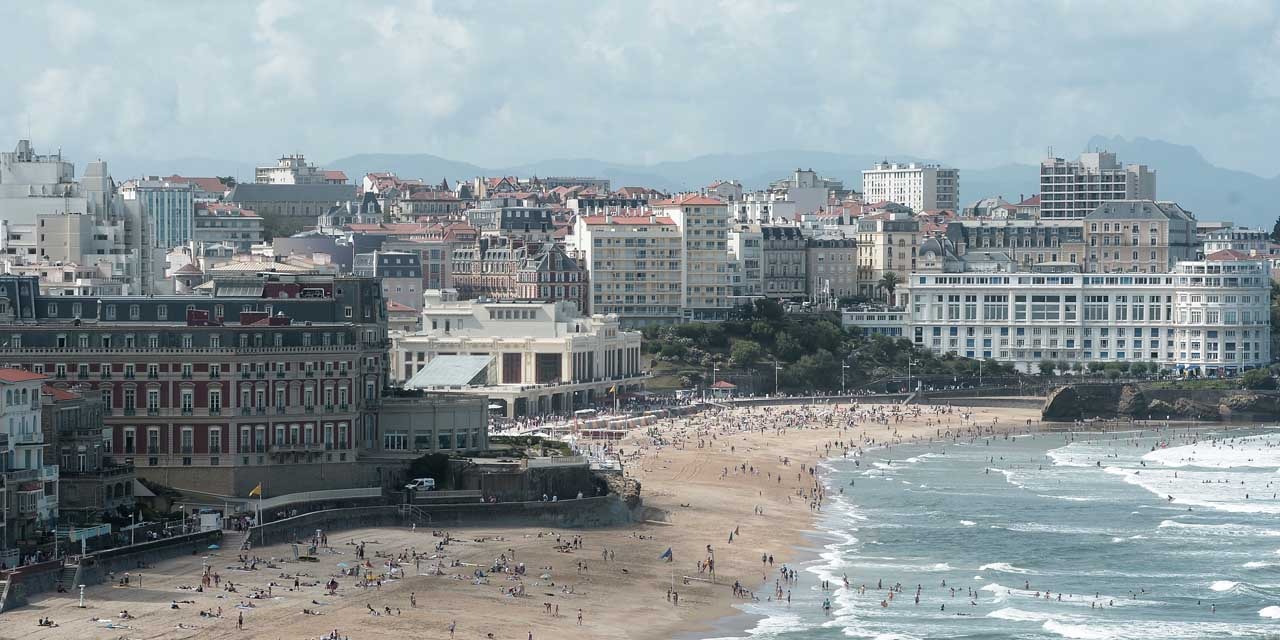In the Basque Country, we especially know the waves and the red and white festivals. But it would be wrong to think that this French region is reserved for surfers, lovers of patxaran shots (local alcohol as good as treacherous, especially at the end of the evening) and independentists. Our columnist Jean-Bernard Carillet takes you Monday on the back roads, towards the beautiful villages in the land, the sacred mountains and the little-known canyons.
Surfing in Biarritz
"On the coast, it is true, happiness is at the end of the reels, in a pleasant Hawaiian atmosphere. The Biarritz sector is the cradle of surfing in Europe, it would be a shame not to take the opportunity to learn. Biarritz bay, on the Côte des Basques beach, where the rollers are not too strong, that's ideal. It all starts on the sand, but make no mistake: already dry, lie down on the board and getting up is far from easy. Then, direction the water with waves of 50 centimeters where one will only hold, at the beginning at least, only half a second. The buttocks too far back will end soaked but we have a lot of fun. Surf schools are increasing but we can't recommend Surf with Charlie too much, with personalized supervision and very small group lessons.
After the effort, comfort will be sought in the local bars, where you can taste good Basque specialties. Another suggestion of sporting activity: golf. The Basque Country is full of beautiful grounds by the sea, including the magnificent 18-hole course in Biarritz.
>> Gastronomy, music, tourism: discover here all our summer topics!
The charm of Guétary
Biarritz is not the only charming seaside resort. Guétary's bohemian, chic and artist atmosphere will seduce you. There are bars, taverns, recreational fishermen and beautiful architecture. The whole has a crazy charm. Don't hesitate to go to Cenitz Beach, the least known of the four in the city, at the foot of the cliffs. Perhaps you will meet Frédéric Beigbeder, who has a residence there.
The huge celebrations in red and white ...
They are canceled this year because of the coronavirus, but the Bayonne festivals are obviously worth the detour. This flagship event in the city lasts five days, during which everyone dons white pants, a scarf and a red belt. From concerts to balls, to traditional dances, cow races and parades of luminous floats, but also masters of Basque pelota, everything is festive and joyful. Push the evening a little and you will come across improvised paquitos: several people sit on the ground one behind the other and make movements back and forth with their arms raised to carry someone at the end of the line.
All on the essential air of the "Peña Baiona", which you will also hear on the opening day of the festivals, interpreted by the Bayonnaise Harmony at the foot of the town hall balcony, before the mayor throws the keys of the city. Thousands of participants then hold the red scarf in hand.
... and more intimate events
But it is also possible to attend more intimate celebrations in small Basque villages, like that of Sare, at the foot of the Rhune massif. The Sare celebrations, planned for the beginning of September, combine modernity and traditions, with in particular Basque showdowns: tug of war, straw lifting, cart lifting, canister lift, sack race or lumberjack competition. Without forgetting of course the pelota tournaments at the trinquet.
The sacred mountain of Rhune
But the Basque Country, these are also unusual corners of nature, such as the Rhune massif. Go deep into the interior and you will come across the sacred Basques mountain, which rises to 905 meters. It is said that witches organized their Sabbath there. It can be reached on foot in 2.5 hours, or in 35 minutes by cog train. On the slopes of the Rhune, observe the pottoks [pronounced "pottiok"], these little horses descended from a Mongolian species which almost disappeared.
The canyons of Haute-Soule
Finally, even more surprising, it is possible to see canyons in the Basque Country, in Haute-Soule more precisely. Dive into the deep bowels of the Kakuetta, Holzarte or Ehujarre gorges, where the torrents are deafening and the dark passages between the steep walls 300 to 500 meters high.
In this world apart, nature obeys other laws. You will appreciate this atmosphere of mystery, just interrupted by marked trails and footbridges, where all civilization seems distant. Canyoning and hiking are king. "

